Cat Rambo's Blog, page 37
December 29, 2016
WIP: Last Week’s Ghost
 I’ve written two stories so far this week, but I think this is the one that will be the next Patreon story. Here’s how it begins.
I’ve written two stories so far this week, but I think this is the one that will be the next Patreon story. Here’s how it begins.
The ghost had chosen the apartment because it was as good a place as any. His body had died in the hospital, but that place was odd and unsettling, seething with the ghosts of things other than human: bacteria and viruses and parasites. Those filled the corridors along with all the childrens’ ghosts, which he found most troubling of all.
He had spent five years altogether in the apartment, the longest he had ever lived anywhere other than his childhood home, which had been torn down decades ago. So he chose it, and furthermore chose the final week of each year, rather than enduring throughout the full 365 days.
There was something about that last week of the year, the stretch between Christmas day and New Year’s eve, that drew him. His wife lived in the apartment for a year after his death, and he stayed a great deal of time in the week, watching her write out overdue Christmas cards, her eyes red rimmed, her jaw set to avoid thinking about the thing that had devastated her.
He was sad for her in the way that ghosts are sad, an abstract and gray sympathy. Ghosts choose this state deliberately. Otherwise they can be torn apart by the grief of their loved ones. It is a choice that shames them, although all of them make it, and so he hid from her, even knowing that she could not see him.
December 20, 2016
GoodReads Giveaway for 2 Signed Copies of Neither Here Nor There
.goodreadsGiveawayWidget { color: #555; font-family: georgia, serif; font-weight: normal; text-align: left; font-size: 14px;
font-style: normal; background: white; }
.goodreadsGiveawayWidget p { margin: 0 0 .5em !important; padding: 0; }
.goodreadsGiveawayWidgetEnterLink {
display: inline-block;
color: #181818;
background-color: #F6F6EE;
border: 1px solid #9D8A78;
border-radius: 3px;
font-family: "Helvetica Neue", Helvetica, Arial, sans-serif;
font-weight: bold;
text-decoration: none;
outline: none;
font-size: 13px;
padding: 8px 12px;
}
.goodreadsGiveawayWidgetEnterLink:hover {
color: #181818;
background-color: #F7F2ED;
border: 1px solid #AFAFAF;
text-decoration: none;
}
Goodreads Book Giveaway

Neither Here Nor There
by Cat Rambo
Giveaway ends December 23, 2016.
See the giveaway details
at Goodreads.
December 17, 2016
WIP: Written in Cinnamon Foam (working title)
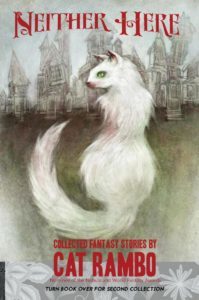 Here’s something from the current piece. For fellow West Seattleites, the coffee shop in question is indeed the Admiral Bird. This is a sequel to “The Wizards of West Seattle,” which is available in Neither Here Nor There, just out this week!
Here’s something from the current piece. For fellow West Seattleites, the coffee shop in question is indeed the Admiral Bird. This is a sequel to “The Wizards of West Seattle,” which is available in Neither Here Nor There, just out this week!
“You need to stop holding a grudge about it,” Penny said.
Albert snorted. “You tried to kill me!”
“I’m a demon. That’s my nature. And it was one of the old lady’s tests. You don’t need to worry about me any more.”
Albert didn’t say anything, but he was unconvinced. In the months since he’d become apprentice to May Huang, one of the wizards of West Seattle, he’d faced several tests, but none as harrowing as that long chase down Alaska Way towards Alki with a long-faced and eager Penny on his heels. Only his encounter and subsequent alliance with Mr. Gray had put a stop to that, and Albert was still unsure what the consequences of that would be.
Penny mocked him. She manifested as a bright-eyed woman of indeterminate age, her face sharp-featured. “Oh, Penny, you’re so scary, oh Penny I can never unsee what I have seen, oh Penny please don’t eat my soul.”
“I’m unclear why don’t eat my soul is an unreasonable demand.”
“I’m just saying, you don’t need to worry about it. Anyhow, Huang wants me to teach you about oracles.”
They were walking down California Ave, passing the Admiral Theater. They both saluted the Little Free Library there, Penny with a graceful curtsey, Albert’s bow slightly more awkward, as they passed.
“I know how oracles work,” Albert said smugly. “That’s how I knew you were something other than human. I found the Oracle, left a crayon in his path.”
“He’s powerful because of the limitations on his magic,” Penny said. “Being able to use only found objects is pretty severe. But there are other routes.” She pointed. “We’re headed to the Bird. I need coffee.”
“Isn’t that a flower shop?”
“And here you have a principle of oracles. Anywhere boundaries blur, they can manifest.”
He’d passed the store a hundred times on walks and seen the flower shop sign, but closer inspection proved the front was a coffee shop, shifting into flowers in the back as seamlessly as two interior shots Photoshopped together.
At the counter Penny ordered coffee but Albert shook his head when she glanced at him. She shrugged. He looked around: dinette tables and chairs, an old truck serving as coffee table, pictures on the wall, the frames the size of his hand, enclosing stamp-sized pictures. He went closer to look.
Each was a scene from West Seattle: the shore at Lincoln Park, the overlook near Huang’s house, the playground at Hiawatha, drawn in fine-nibbed pen and colored in jewel-colored inks that made each one, a summer’s day, come alive. They were as bright and lovely as the day outside, and he craved one of them instantly.
A little label by the cluster said, “Enquire at the register about the price.” He went back to where Penny was counting out her bills.
He waited till she was done and asked the woman at the counter, “Excuse me, how much are the pictures?”
She tilted her head, considering him. He was suddenly conscious of the smear of yogurt from this morning’s breakfast on the knee of his jeans, the fact that he hadn’t bothered to shave, and his “Uncle Ike’s Pot Shop” t-shirt.
Let me know what you think! Patreon supporters, you get to be the first ones to see the finished version. 
December 16, 2016
7 Ways to Spread The Word Everywhere of Neither Here Nor There!
Announcing my new collection, Neither Here Nor There. If you’re familiar with earlier collection, Near + Far, this is the same double-sided format, with secondary world fantasy stories on one side and fantasy set in our own world on the other, including an original story, “The Wizards of West Seattle,” that will appeal to fellow Seattleites.
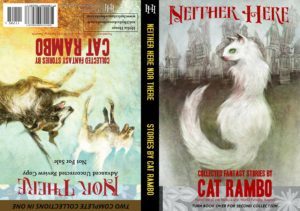
Publisher’s Weekly gave the book a starred review, and other advance reviews have been very kind. Will you help me get the word out in time for people’s holiday shopping?
What can you do? Well, sure, buying the book is great. Here’s the links to the physical and electronic versions.
I’ll make B&N, Kobo, Powell’s, etc links available when I have them as well.
But here’s some other, better ways that you can help spread the word:
 1. Request it through your library. Most will even let you do this online. The information you need is publisher: Hydra House and ISBN: 978-0989082877
1. Request it through your library. Most will even let you do this online. The information you need is publisher: Hydra House and ISBN: 978-0989082877
2. Request it at your local bookstore. It’s available through Ingram, a major book distributor, so they should be able to get it.
3. Write an Amazon, GoodReads or other booksite review. Amazon reviews are great! So are other book selling/reviewing sites such as Goodreads, LibraryThing, and Shelfari!
Here’s the book listing on GoodReads. While there, enter the giveaway.
4. Blog about the book. Any mention of the book, particularly one that explains why you liked it, is awesome. Or come blog for me! I’m looking for guest posts about writing, F&SF, or related subjects. Mail me if you’re interested; the offer has no expiration date, since this is something I’m planning on doing on a regular basis.
5. Share news of it on social networks. Sharing links on Facebook and other social networks is great. Just favoriting, plusing or liking posts helps give them a little Google juice. Even going to the Facebook page and clicking “Like” helps. I’ve attached a couple of images that can be used as social media icons and/or backgrounds.
6. Share news of it on mailing lists and other groups. Pass the news along to your fellows on writing, literary, or SF-related discussion boards, BBSes, mailing lists, and other forums
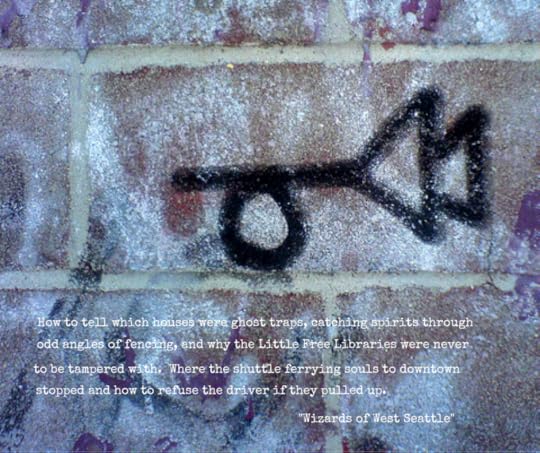 7. Let me know if I’ve overlooked something! Many of you are writers and creative types who also often have something to promote. Please feel free to send me your notices, and if you like the idea of this post, feel free to use what you can from it.
7. Let me know if I’ve overlooked something! Many of you are writers and creative types who also often have something to promote. Please feel free to send me your notices, and if you like the idea of this post, feel free to use what you can from it.
Thanks for reading through all this, and thank you very much for your support in the past. I’m pleased with how lovely this collection looks, and very happy that it’s out in time for holiday shopping!
All the best,
Cat
December 14, 2016
Live Classes for January Through March 2017

I pulled this quote from Ann’s class and it still seems to sum up so much.
There is still room in the two live classes left this year, both happening next weekend. The first on Saturday is Linguistics for Genre Writers with Juliette Wade, at the usual 9:30-11:30 AM Pacific time. This class differs from pretty much every other one I’ve seen in that Wade doesn’t just cover linguistics and worldbuilding, but how to use the principles of linguistics to strengthen, deepen, and otherwise improve your prose. I heartily endorse it.The second, which is also a really fun and informative class, is To Space Opera and Beyond with Ann Leckie. Technical difficulties hindered the first sessions but everything is smooth and running well now! In this class, Ann talks about space opera, its characteristics, how to handle them, and the process of writing not just a single novel but a series, while we provide writing exercises to take away and use to apply what Ann has told you. Ann is a lively and congenial teacher, funny without being snarky, and above all encouraging and inspiring. I’m really looking forward to the next class, which happens on Sunday, December 18, 9:30-11:30 AM Pacific time. There is still room in that and the Saturday, January 7 class at the same time.
I am offering the six session Writing F&SF Stories Workshop again, in three different sections:
Section 1: Tuesday afternoons 1-3 PM, January 3, 10, 17, 24, 31, and February 7
Section 2: Wednesday evenings 7-9 PM January 4, 18, 25, and February 1, 8, 15
Section 3: Sunday evenings 5-7 PM January 8, 15, 22, 29 and February 5, 12
I am offering the Advanced Story Writing Workshop on Tuesday evenings 5-7 PM starting January 3rd and going for six weeks. The Advanced Workshop focuses on workshopping stories each week along with lecture, discussion, and in-class writing exercises designed to help you continue to refine your skills and expand your toolset.
I am also doing a very limited number of individual tutorials. This is a one-on-one class composed of 15-30 minute sessions scheduled to fit your time demands and aimed at what you want to cover. In each one, we will go over the past week’s writing assignment, discuss problems, focus on what you want to be working on, and help you create a writing practice that is productive, energetic, and above all enjoyable. Initial cost is $100 for a commitment of four sessions; the tutorial can be extended as desired. For either of these options, you must either have taken the Writing F&SF Stories Workshop or send me a story (4k words or less) that convinces me you don’t need that workshop.
Other classes are single sessions, usually two hours, although we often spill over another half hour in order to answer questions. All of the following take place 9:30 to 11:30 AM, Pacific (Seattle) time.
The Power of Words with Juliette Wade, Saturday, December 17
To Space Opera and Beyond with Ann Leckie, Sunday, December 18 or Saturday, January 7
Character Building Workshop, Sunday, January 8 or Saturday, February 10
Creating an Online Presence for Writers, Saturday, January 14
Description and Delivering Information, Sunday, January 15 or Sunday, March 18
Literary Techniques for Genre Writers I, Saturday, Jan 21 or Saturday, February 17
Literary Techniques for Genre Writers II, Sunday, January 22 or Saturday, February 25
First Pages Workshop, Saturday, January 28
Flash Fiction Workshop, Sunday, January 29 or Saturday, March 11
Moving from Idea to Draft, Saturday, February 4 or Sunday, February 26
How to Rewrite, Edit, and Polish Your Fiction, Sunday, February 5
Writing Your Way Into Your Novel, Sunday, February 11 or Sunday, March 11
Class space is limited, so I suggest registering sooner rather than later. To register for a class, mail me with the following details:
The email address that you use for Google stuff.
Which class or classes and the dates.
Please remind me if you have already taken a class with me so you can get the former student rate ($79 for individual classes, $199 for the six-week workshop). Otherwise the cost is $99 for individual classes, $249 for the six-week workshop.
Whether you would prefer to pay via Paypal, check, or some other means.
Upon receiving that, I will send you an invoice .
Important! Remember every class has a Plunkett scholarship for students who could not otherwise afford the cost. To apply for a Plunkett, mail me and tell me why you want to take the class in 100 words or less. Include the name and date of the class, please!
Trying to find a gift for that writer on your list? I’m happy to do gift certificates for both live or on demand classes and tutorials; mail me to work out details.
Did you make it all the way down here? If so, here are some holiday baby goats for you:
December 4, 2016
What I Wrote in 2016 and The List of Award Eligibility Posts I’ve Found
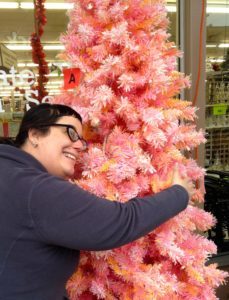 Oh, it’s that time! The season of looking back at the year and seeing what you did or didn’t get done. And the season for starting to nominate for awards. I’ve been reading and recommending for a while now, but it’s always fun to read all the wrap-up posts and find anything that I missed. I do have a monster post full of some of this year’s reading, but I’m still working on that. (When I have it, there will be a link here.)
Oh, it’s that time! The season of looking back at the year and seeing what you did or didn’t get done. And the season for starting to nominate for awards. I’ve been reading and recommending for a while now, but it’s always fun to read all the wrap-up posts and find anything that I missed. I do have a monster post full of some of this year’s reading, but I’m still working on that. (When I have it, there will be a link here.)
Writers wondering whether or not they should put up an awards eligibility post, the answer is yes, yes you should. Do us all the favor of collecting your stuff and making it easy to find. If you’ve got a lot, point out some favorites.
The stories of my own I am pushing this year are “Left Behind” (short story), “Red in Tooth & Cog” (novelette), “Haunted” (novella co-written with Bud Sparhawk), and the fantasy collection Neither Here Nor There. SFWA members should be able to find copies of those on the member boards; I am happy to mail copies to people reading for awards whether or not you are a member. Drop me a line and let me know the preferred format. I am looking for reviewers interested in Neither Here Nor There and happy to send copies as needed.
Here’s the overall 2016 publication list as far as my stuff goes. Altogether the count was 12 short stories, 2 novelettes, 1 novella, 2 story collections, and a new edition of a nonfiction work. No novel, argh, but Hearts of Tabat is a definite for 2016, huzzah. I had a decent output, plus managed to create/teach a bunch of classes, and do a little for SFWA here and there, despite a lot of travel and some midyear health issues.
This time I’ve tried something new and provided a little excerpt for each story, a practice I snagged from Rachel Swirsky and Fran Wilde.
Stories/Novelettes/Novellas
Short Story:
 Seven Clockwork Angels. This short story is a retelling of Sleeping Beauty and appeared as a Patreon post, then was collected in Altered America later that year.
Seven Clockwork Angels. This short story is a retelling of Sleeping Beauty and appeared as a Patreon post, then was collected in Altered America later that year.
Scuttlepinch steepled his fingers as though preparing a classroom lecture. “I have harnessed various eldritch and magnetic energies,” he said. “Whatever fate the machine pronounces for an individual, will come true, with 98% accuracy. And…” He sneered here, and would have twirled his moustache if it had been long enough. “The fates are never pleasant ones.”
The Mage’s Gift. This short story is set in Serendib, the same location as “The Subtler Art”, and features the same characters.
This is a story of Serendib, the origami city where dimensions intersect and where you step between worlds as easily as turning down a new street to hear the stars singing overhead or the clanging steps of automata on patrol or centaur hoofs clattering over concrete. Everyone that comes to Serendib has a story, and sometimes those stories continue well after they’ve come to stay.
“Tongues of Moon Toad” in Ann VanderMeer’s The Bestiary Anthology. I’m very fond of toads, and a chance to make one up for a project by a favorite editor was a lot of fun. Short story.
A particular kind of toad is not a toad. These not-toads are called Tongues of Moon or False toads or other names less mellifluous. Such a toad does not believe itself a toad, but rather a dog, or a dragon, or an alabaster statue. Something very difference from the earth and flesh of its origin.
“The Mermaid Club”, co-written with Mike Resnick, in Conspiracy! edited by Tom Easton. Our hapless protagonist discovers an ancient feminist conspiracy and alien mermaids. I had a certain amount of fun with this one.
The first rule of Mermaid Club is…
Well, you should know the rest first. Let me start again.
Call and Answer, Plant and Harvest. Another Serendib short story, this time appearing in Beneath Ceaseless Skies’ Science Fantasy issue and featuring a side character from “The Subtler Art,” Cathay the Chaos Mage.
When she arrived in the city, she had three seeds, a dusting of lint, and a peppermint candy in her pocket. She found an empty lot, precisely between a street where water magic ruled, in constant collision with the road made of fire and iron, so daily fierce sheets of steam arose, driving the delicate indoors and hissing furiously so it sounded as though a swarm of serpents was battling.
She popped the mint in her mouth despite its linty covering and dug a hole with her little finger, and then one with her thumb, and a third by staring at the dirt until it moved. Into each she dropped a seed, and covered it up, and sat down to wait, sucking on the candy and listening to the steam’s whispers.
Web of Blood and Iron. Another Patreon steampunk story, also included in the Altered America collection. A Marxist manservant helps a English werewolf and peer to win a deadly race of car versus train.
I was up quick, and went in to help him off with his tuxedo, ripe with boozy sweat and cigar smoke and the hyacinth scent the siren whores wear. He was so drunk I was surprised he’d made it home at all, that none of the vampire gamblers had decided to take him home as a nightcap instead of selecting a whore.
“Left Behind” appeared in a favorite market, Clarkesworld Magazine. Pretty happy with this one as well; I think it tries to look at gender stuff and make some predictions.
Her office doorway was one of the many things that annoyed Shi about her job. It wasn’t a proper door, one that could be closed, but an open arch. She’d complained about it more than once, but been told that doors were antithetical to the institute’s brand.
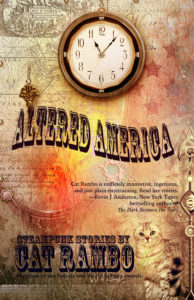 “Thursday’s Child” is a Patreon-supporters only story, set in Baltimore in the world of Altered America.
“Thursday’s Child” is a Patreon-supporters only story, set in Baltimore in the world of Altered America.
Peppermint and vanilla is what she smells like, not like poison, but I know if the world was right, she would. And so I’ve got two puzzles set me. The first is what to do with this Miss Nerium, standing here in the front parlor talking with my mistress, Mrs. Thursday, and second is how is she keeping me from smelling what she is?
Because if it means that she knows what I am, things are worse than I had thought.
Aardvark Says Moo is another Patreon supporter story but this flash piece is available in its entirety. It was inspired by a discussion of the alphabetizing of story lists.
“Whimsy,” my child says, “is playfully quaint or fanciful. A talking aardvark impersonating a cow is just dumb.”
“The Rest Between the Notes” was written for Cyberworld: Tales of Humanity’s Tomorrows, edited by Jason Heller and Josh Viola. This book had a cool Kickstarter campaign that it’s lived up to, including a Playstation 2 theme for the book.
“You’re a creature of disgusting privilege,” Rosalie lectures. She comes from a socialist country where there aren’t families like mine and words like “hereditary wealth” and “plutocracy” and “blueblood” mean different things. She thinks if she tells me this, I’ll be seized with guilt about the unnaturalness of my social position. Maybe I’ll flee to one of the unrelieved countries and work towards social justice there. Whenever she says things like this, I catch her watching me as though calculating how exactly to get me to Live Up to My Responsibilities as a Human Being.
Fuck that.
Gods and Magicians was a Patreon post that is publicly available. A flash piece, it owes a great deal to Lord Dunsany and his peers.
The magician gestured. Out of the pool came musicians, the very first thing the tip of a flute, sounding, so it was as though the music pulled the musician forth, accompanied by others: grave-faced singers and merry drummers; guitarists and mandolinists with great dark eyes in which all the secrets of the moon were written; and one great brassy instrument made of others interlocked, so it took six to play it, all puffing away at their appointed mouthpiece. All of them bowed down to the priestess who stood watching, her sand-colored eyes impersonal and face stone-smooth.
“Books Are No Good” is a short story that appeared in Champions of Aetaltis, edited by John Helfers and Marc Tassin.
It started, as so many things do, with a book. In this case, a book of adventure stories authored by one Octavia Viort, entitled The Curious Peregrinations of a Goat Herder, in which Octavia, at first a simple goat herder, was swept up by chance into adventure to the point where she circumnavigated the Sea of Tears, fighting great serpents and cat creatures in the Zhamayen jungle, journeying into the Deeplands for ancient treasures, taking a series of highly unsuitable lovers, including a half year spent among the elves, and generally leading a much more exciting existence than that of an innkeeper or her maid.
Each adventure had been more exciting – and more improbable – than the last. While Letitia didn’t doubt that there were seeds of truth hidden here and there within Octavia’s pages, most of what had sprouted from them were exaggerations, misrepresentations, and on occasion, outright lies. Books were good for nothing.
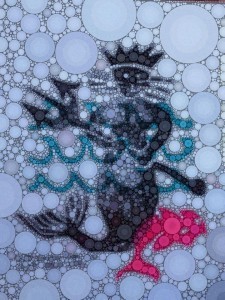 Novelette:
Novelette:
“Red in Tooth and Cog”, which is one of my favorite stories. This novelette appeared in The Magazine of Fantasy and Science Fiction, and I read from it at the magazine’s reading at Worldcon in Kansas City this year. It’s a near future story, featuring…
“Feral appliances?” she said in disbelief. She’d heard of such things, but surely they were few and far between. Not something that lived in the same park in which she ate her lunch every once in a while.
“The Threadbare Magician” is a novelette that appeared in the anthology Genius Loci: Tales of the Spirit of Place, edited by Jaym Gates. It’s part of my Seattle-based urban fantasy world, and features a magician whose magic works through Hawaiian shirts.
The spell struck up from a black background, red serpents, scales lined with scallops as blue as the sky outside. Slashing bites along the outside of my left hand, locking on, tails sticking straight out as they attached themselves.
I lurched sideways.
The floor crashed up into my face, thunked against my forehead in painful collision.
Then I was gone.
Novella:
“Haunted” is a novella co-written with Bud Sparhawk, and is far future space fantasy. Writing it was a lot of fun and a real learning experience.
I had imagined my stay in the Graveyard as sentinel would provide a similar refuge. And, as I’d imagined then, I was out of range of all but the most insistent of signals, and even those were weakened by distance.
I recalled how I’d pressed close against the small transport’s port for my first sight of the Graveyard a year before, peering though the shuttle’s spiderlike tracery of spar and line, cable and post. The port framed distant stars as we moved on a trajectory that would intersect the Graveyard’s long path about the sun and find the station that would be my future home.
“I confirmed our approach,” the pilot said over his shoulder. “Enjoy the free fall while you can.”
I tapped the kitten’s carrier, a transparent sphere in which she was amusing herself by caroming off the inner surfaces. She swatted at my finger and did a backwards somersault.
“Enjoy it while you can,” I echoed, “Gravity’s coming.”
 As far as book length stuff goes, I had two collections: Altered America: Steampunk Stories and Neither Here Nor There. I also produced a new edition of Creating an Online Presence; I already have plenty of notes for the next version.
As far as book length stuff goes, I had two collections: Altered America: Steampunk Stories and Neither Here Nor There. I also produced a new edition of Creating an Online Presence; I already have plenty of notes for the next version.
My other notable nonfiction primarily appeared on the blog. I’ve sorted it into categories below.
Writing Advice:
Working with Twinned and Twined Storylines
How to Blog without Really Trying But Still Managing Not to Be Half-assed About It
Re-visioning, Rewriting, and Other Forms of Finetuning Your Fiction
Writing Career Advice:
How I Use Instagram
Your Online Presence: Is It Fun at Parties?
To Eligibility Post or Not to Eligibility Post?
On Clarion and Privilege and the Internets
Surrey International Writers Conference Keynote Address: Into the Abyss
Celebrating Beneath Ceaseless Skies
Nattering Social Justice Cook series:
NSJC: Stay the Course
NSJC: Be Kind to Yourself
NSJC: DIY Cooking Kits
NSJC: Prepare to Ride, My People
SFWA Stuff:
What SFWA Offers Game Writers
The Fireside Fiction Report and SFWA
The Ninjas of Griefcom
Nebula Conference 2016
SFWA is Many Things, But Not a Gelatinous Cube
And now for the part you’re scrolling down for! 
November 23, 2016
Nattering Social Justice Cook: Prepare to Ride, My People
 To those who have said “wait and see” about the results of the election, I have seen enough events and phenomena to feel that I am sufficiently prepared to venture an opinion on the results of the election. Here are some, listed in random order:
To those who have said “wait and see” about the results of the election, I have seen enough events and phenomena to feel that I am sufficiently prepared to venture an opinion on the results of the election. Here are some, listed in random order:
An effort to compile a blacklist of overly-liberal educators.
The discussion about creating a registry of Muslims.
White nationalists cheering for Trump with Nazi salutes.
Pettiness and an unwillingness to take criticism to a degree that is terrifying in a President.
Someone who doesn’t believe in evolution being considered for Secretary of Education.
An announcement that he doesn’t intend to stay in the White House but wants the city of New York to fund police protection for Trump Tower. The cost is over a million dollars a day. It might be noted that during the election, Trump insisted he would rarely leave the White House.
The appointment of an alt-right thought leader to the position of Chief Strategist.
Ethics violation after ethics violation, which doesn’t bode well.
A $25 million pay-off on fraud charges.
Clear signals he intends to dismantle net neutrality.
War being declared on journalism.
An Attorney General pick who is against all forms of gay rights, including marriage and don’t ask, don’t tell.
A whole lot of ugly behavior by folks doing it in Trump’s name.
I need to stop because the more I look, the more the hits keep on coming. What a bizarre time to live in.
So. For those of you who either didn’t vote for Trump or did and now are all “I’ve made a huge mistake“, aka the sane and/or informed ones, yeah, buckle up because it’s going to be a rocky ride. At best, a lot of wealthy people are going to skim money from our government while changing laws so they can exploit us even more while at the same time, hatred and intolerance are normalized and neo-Nazis are allowed to try to silence dissent. At worst our rights are stripped away and things go up in flames.
There were election shenanigans, to a point where people should be at a minimum auditing the results. There was documented Russian interference and more than that, there was the result of sedulous gerrymandering on the part of the Republicans for the past decade along with their removal of the Voting Rights Act.
In my opinion. You may disagree, and that’s fine. This is what I think and what’s driving my actions over the next four years. I am going to speak up and object and point things out. I am going to support institutions that help the groups like the homeless, LGBT youth, and others whose voting rights have been stolen and whose already too-scant and under threat resources are being methodically stripped away.
I am going to continue to insist that honesty, tolerance, and a responsibility for one’s own words are part of our proud American heritage, the thing that has often led us along the path where, although there have been plenty of mistakes, there have been actions that advanced the human race, that battled the forces of ignorance and intolerance, and that served as a model for the world. That “liberty and justice for all” are not hollow words, but a lamp lifted to inspire us and light our way in that direction.
I will continue to love in the face of hate, to do what Jesus meant when he said hate the sin while loving the sinner. I will continue to teach, formally and by setting an example of what a leader, a woman, a good human being should do, acknowledging my own imperfections so I can address them and keep growing and getting better at this human existence thing. If I see a fellow being in need, I will act, even if it means moving outside my usual paths.
I will not despair or give way to apathy. And as part of that, I will celebrate the good, point out the wonderful, witness the absurd, the amazing, and even the wryly amusing. I will let my sense of humor buoy me, and I will continue to consider the alt-pantless, sorry, alt-right, petty, pathetic, and laughable. They know that they are. Writing in 1944 about anti-semitism in his essay Anti-Semite and Jew: An Exploration of the Etiology of Hate, Sartre stated things with a prescience that makes his words apply to their theater of outraged outrageousness, in which they prance around with the self-importance of bright preteens who have just discovered death metal and nihilism.
Never believe that anti-Semites are completely aware of the absurdity of their replies. They know that their remarks are frivolous, open to challenge. But they are amusing themselves, for it is their adversary who is obliged to use words responsibly since he believes in words. The anti-Semites have the right to play. They even like to play with discourse for, by giving ridiculous reasons, they discredit the seriousness of their interlocutors. They delight in acting in bad faith, since they seek not to persuade by sound argument but to intimidate and disconcert.
I will not be intimidated or disconcerted. Feel free to laugh at my naiveté, my over-earnestness, and idealism. I’m going to dance right past you, m-fers, and you will never know what hit you.
Language matters. Truth matters. Even in the face of this sort of thing:
The world is broken. Love isn’t enough to fix it. It will take time and effort and blood and sweat and tears. It will stretch some of us almost to the breaking point and others past it. We must help each other in the struggle, must be patient and kind, and above all hopeful. We must speak out even when we are frightened or sad or weary to the bone.
The millennials, may the universe bless them, are inheriting a shitty world. Those of us from older generations must teach and support and help where we can, realizing that what we do now affects the rest of their lives. We cannot let things slide into any of the nightmarish worlds we see depicted in so much science fiction, but if we do not act, they will. I will not sugarcoat things; it may be too late. But living as though it is not is the only way we’re going to survive.
Act now. Even if it’s just saying hello or smiling at someone that you wouldn’t normally. Start putting some good energy out in the universe to counteract the fog of hate. You’ll be surprised by how much better it makes you feel. Don’t pay attention to the trolls; they’re trying to keep you busy so you won’t act, to discourage you into slumping back onto the couch before you can even take a step out the door.
And here’s a recipe for the best chocolate chip cookies I know. In case you need a little chocolate in your life. We’ve gone through several batches of them in the past week here at Chez Rambo.
Bright blessings on you all,
Cat
November 22, 2016
For Writers: Re-visioning, Rewriting, and Other Forms of Fine-tuning Your Fiction
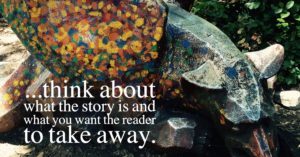 Yesterday I taught a day-long workshop on rewriting and editing one’s work for Clarion West. I usually do this as a two hour online workshop, so it was interesting to take the class and get a chance to really flesh it out, particularly since I can use this version to create an on-demand version.
Yesterday I taught a day-long workshop on rewriting and editing one’s work for Clarion West. I usually do this as a two hour online workshop, so it was interesting to take the class and get a chance to really flesh it out, particularly since I can use this version to create an on-demand version.
As with all writing advice, mileage will vary according to the individual. The best thing as a writer that you can do is to pay attention to your own process and make it more effective. Experiment with lots of things, identify the practices that work, and incorporate them into your process. Keep experimenting, mixing things up a little, every once in a while, writing to the sound of whale songs, or dictating while hiking, or using a pen rather than the keyboard — it doesn’t matter what as long as you keep testing things in a way that lets you grow as a writer.
The Revision Process is Not One-Size-Fits-All
In thinking about revision, one has to acknowledge that some things really affect the process in a way that makes it vary from author to author, such as:
The length of the piece. A novel is a much different thing than a story, and one of the basic differences is that you (or at least in my experience) can hold the entirety of a story in your head in a way that you cannot with a novel. Novels are also more complicated, usually involving multiple storylines and subplots in a way stories cannot, which adds extra steps. In this piece, I’m focusing on short story, but I’ve got an additional list of considerations when working with novel length stuff that I’ll cover in the online version, which should go up in the Rambo Academy at the beginning of December.
Whether the writer’s rewrite process focuses on subtracting or accreting. In my experience the majority of writers overwrite, and the focus of the revision process is trimming away excess. But some folks are accreters, by which I mean their process is one of adding and fleshing out. This definitely affects the revision process.
Where you lie on the outliner vs. pantser continuum. Do you write out a 30 page outline before you begin writing or do you sit down and see where the words take you? My theory is that the amount of overall work a writer does is invariable; some writers do it beforehand and others do it afterwards while revising. The more outlining and prep work work that happens beforehand, the less will (usually) be necessary in the revision stage.
Some stories simply need less work than others.
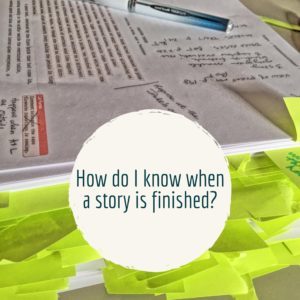 How to Know When You Are Done Revising
How to Know When You Are Done Revising
This is the question that comes up more than any other: how do I know when a piece is ready? The way I do it is by breaking down revision into a three stage process. When you finish the last step, start sending it off, and don’t revise between submissions (unless someone gives you amazing advice). Figure out 3-5 markets and as soon as it comes back from one, send it to the next.
Here are the stages of revision. Before you start them, you must a) have a first draft and b) set that draft aside to cool for a while. Stephen King suggests putting a novel aside until you no longer think about it on a daily basis. With a short story, give it at least a week, preferably two.
And that first draft can be terrible. Really. You’ll be able to fix it. The first draft is just you flailing around. That’s perfectly natural. You throw words, sentences, paragraphs and scenes onto the page, perhaps in the order that they will stay in, perhaps in a totally different assemblage. That’s okay. You have the words.
Stage I of the Revision Process: This is where you figure out your plan of attack. Read through, with a notebook handy for jotting stuff down if it occurs to you but mainly focusing on the manuscript. Keep track of holes, scenes that still need to be written, as well as major changes. I print out a copy and I write all over it; append things, scratch things out, move pages from here to there.
Focus on big ticket items, things that affect the manuscript at the top level: moving scenes around, changing POV or verb tense. Making sure that the chronology is correct, particularly when working with multiple view points. Think about the characters.
Are they likable – do the reader have some point of identification with them? It can be something very small, such as showing them taking care of something like a pet or plant. Are their motivations clear? Do you know what they want, what’s keeping them from getting it, and how they plan to change that situation? Do you have some sense of their history before they entered the piece, and how can you reflect that in the piece? Where can/should you go more deeply into their head?
What’s the overall story arc? What’s the human experience at the heart of the work; what’s it trying to say about being an intelligent self-aware entity? What promises are you making to the reader and where don’t you live up to them? Where can you make things clearer for the reader? Are there missing scenes? If so, write them now.
What’s the pacing like; are you moving the story along in a smooth flow that pulls the reader in? If not, where are you failing to do so?
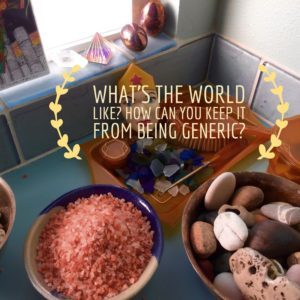 What’s the world like? How can you keep it from being generic? What details does your reader need to know and where have you forgotten to supply such information? How does the world feed into the theme of your story? Where are the cool eyeball kicks and nifty things that will entertain your reader?
What’s the world like? How can you keep it from being generic? What details does your reader need to know and where have you forgotten to supply such information? How does the world feed into the theme of your story? Where are the cool eyeball kicks and nifty things that will entertain your reader?
Don’t fix things about the style or other sentence level considerations, but keep a list of these that you’ll be able to address in a later stage.
Stage II of the Revision Process: You marked all over the printout, making changes and then incorporated them. Here I print out a fresh copy, because unfortunately my process is not particularly eco-conscious.
Now you’re looking at a finer level than the first pass. Stage I was coarse sandpaper; now you’re moving to a finer grade. This is the point where I look hard at paragraphing, splitting up overly long paragraphs, using single sentence paragraphs for an occasional punch, and making sure the first and last paragraph of every scene works, creating a transition that doesn’t allow the reader to escape the story.
I have an unfortunate propensity for scattering scene breaks through my work; this is the place where I remove a lot of them, because I know that every time one occurs, it bumps the reader out of the story and reminds them that they’re reading. I also remove a lot of unnecessary speech tags at this point. I make sure the speaker is identified every third or fourth speech act in two people dialogue so the reader never has to count back in order to figure out who is talking at any point.
I’m also looking at sentence length. Here is an exercise that may be useful: take a page of your prose and go through counting how many words are in each sentence. If they are all around the same length, it creates a sense of monotony. Split things up. Short sentences have punch; long sentences full of polysyllabic words create a languorous, dreamy feel that may be desirable to your narrative yet radically slows things down on the page. (Did you catch what I did there?)
Stage III of the Revision Process: Once again, edits are made on the computer and printed out. Time for your very finest grade of sandpaper, the last few passes. In this, I rely heavily on Ken Rand’s excellent little book The 10% Solution, which I cannot recommend heartily enough. This is the point where you pick up individual sentences and tap them to make sure they ring true.
Above all this is the stage where you read aloud. If you do not read your work out loud and you take only one thing away from this essay, please make it starting to read your stuff out loud. You will catch errors and repeated words. More importantly, you will catch infelicities and ungraceful sounds.
And this is how you know you are done. Once you have done this once, perhaps more depending on your degree of perfectionism, the story is ready to have a cover letter attached and to go out into the world. Celebrate briefly, then go work on a new piece.
Learning to Trust Yourself as an Editor
Part of being a writer is the act of writing, letting the words flow out onto the page. It’s a joyful part when the words are coming fast and quick and wonderful.
Another part is the act of rewriting, taking the results of that flow and turning them into a wonderful writing. If you know that you can do this, it helps with the act of writing, because you’re not worrying about whether what you’re writing is good or not. You know that what matters is producing the words, because you can trust yourself to make them better.
If you have a lump of words, you can always turn them into something, even if it takes resorting to outrageously and wonderfully experimental techniques like a cut-up in the mode of William S. Burroughs. With a blank page, your options are considerably more limited.
Once you learn to trust your editing skills, worrying about the writing’s quality will not impede the flow — at least as much, given that we are all a bit insecure. Think of trapeze artists – if you can trust the safety net that editing will provide you, you will be able to take the risks necessary to learn how to execute amazing aerial maneuvers in your writing.
How do you learn to trust yourself as an editor?
Read widely both in and out of the field, and read at least one classic for every piece of trash.
Read what people say about the field and writing in general. Are there writers you like? They may well have written about their process, which you can usually find via their website.
Look at what people do in their writing and how they do it. Here are some books I recommend: Carol Bly’s The Passionate Accurate Story, Dave Farland’s Million Dollar Outlines, Stephen King’s On Writing, Ursula K. LeGuin’s Steering the Craft, Shawl and Ward’s Writing the Other, Phyllis Whitney’s Guide to Fiction Writing, Kate Wilhelm’s Storyteller. Want to go deeper than that? Try Wayne Booth’s The Rhetoric of Fiction, Samuel R. Delany’s About Writing, Hoffman and Murphy’s Essentials of the Theory of Fiction, Michael Moorcock’s Wizardry and Wild Romance, Jeff Vandermeer’s Wonderbook, or Williams’ Style: Lessons in Clarity and Grace.
Have some notion in your head of what writing is supposed to do. Teaching classes is a pretty good way to acquire this. So is thinking hard about it and writing essays. One of the best essays I know on the subject is George Orwell’s “Politics and the English Language.”
Your Writing Group and the Revision Process
Your writing group — or your group of beta readers — is a huge asset when working with a piece. You will want different kinds of feedback from them depending on what stage the manuscript is at, so let them know: are you looking at the big picture or is the piece about to go out and you just need copyedits and minor tweaks.
You do not have to take every piece of feedback that is given you, particularly if you don’t think the person understood what you were trying to do with the story. I have found that if everyone is pointing to the same thing about a story, it is indeed broken at that spot, but usually none of the suggested fixes will work and I will need to go off, think hard about it, and come up with something that works.
I feel that one learns more from critiquing than by being critiqued, overall, and so participating in a writing group is part of that learning to trust your internal editor.
Letting Go
Sending a story out into the world can be hard, particularly if you’re not sure that it’s ready. But you must. Sending pieces out and getting feedback, even when it’s a simple yes/no, is part of being a writer. Stories sitting on your hard drive do no one any good, particularly you. Good luck!
#sfwapro
November 17, 2016
Nattering Social Justice Cook: Stay the Course
 Like many of you, I was taken aback by the results of the recent election, to the point of depression, dismay, and concern for our future. Part of my past week, though, was spent in Chicago at a conference for nonprofit leaders, and that served as a heartening antidote in some ways.
Like many of you, I was taken aback by the results of the recent election, to the point of depression, dismay, and concern for our future. Part of my past week, though, was spent in Chicago at a conference for nonprofit leaders, and that served as a heartening antidote in some ways.
Part of that experience was the reminder that our world holds people who don’t know where their next meal is coming from, or if they’ll have a dry place to sleep that night. That there are children who are abused, animals who are tortured, nations being oppressed, even eco-systems being destroyed. That so much is wrong. That so much needs fixing. Is it odd to say that was heartening? Because it was so inspiring to be around hundreds of people who have given their time and energy and so much more to help others.
It underscored the fact that we are not islands. We are part of humanity, a deep, rich pool in which we swim, and we will either do so or sink, collectively. The question of where to start with that is one that divides many of those who desperately want to fix things. And the truth is this: that helping wherever and whenever you can is fine, no matter what form it takes. The act of helping others enriches our souls and keeps them nourished.
There’s a concept created by Abraham Maslow, a hierarchy of needs. It looks like this:
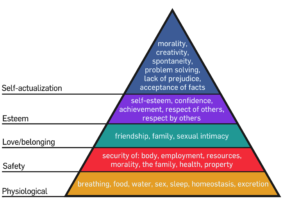
The principle is simple. The lower on the pyramid, the more important the need. Until that need is filled, the person will not focus on the needs above it. The person with physiological needs like food, sleep, and shelter cannot focus on the needs other than that until those needs are met. Self-actualization needs, like education, creativity, and spirituality, cannot be addressed until all other psychological and basic needs are met.
These are generalizations, obviously. Am I saying that hungry people can’t think about self-actualization? No, but the overall trend — to which there will always be exceptions — is that they don’t. I suspect that the further up the pyramid you are, the more exceptions occur.
Here’s an important thing when you’re thinking about that pyramid and America. In a recent study by the Federal Reserve Board, 47% – close to half — of the respondents said that if an emergency arose requiring them to get $400, they would have to borrow the money or sell something in order to come up with it.
That means that almost half of the people responding — which would be a group that probably didn’t include children (who represent a significant chunk of the homeless population) — had less than $400 tucked away in case of the proverbial rainy day. Which could take the form of a medical emergency. Or a car repair. An unexpected hike in tuition, rent, or even groceries. Do not pass Go; do not collect $200.
If you’re not part of that group, take a moment to think about what that means and what that anxiety would add to daily existence. Think about that anxiety as a lifelong roommate. (If you are part of that group, sorry. I know things are depressing as is. I’ve been there briefly, for what it’s worth.)
There is often an idealism about the Left that is admirable, that is stirring, and that sometimes, unfortunately, clashes with pragmatism and does not emerge the victor. I personally believe human beings are primarily good — but I also know everyone’s flawed, everyone’s got a whiney and entitled inner child, and that sometimes we let that inner child steer the boat when we shouldn’t. And that inner child is more in connection with the needs Maslow talks about than one might like to acknowledge.
Here is a fact that holds true in a complex world, at least in my experience. Social justice falls on different places in the hierarchy depending on an individual’s circumstances. Are you a person who has to worry that if you are stopped by American police you may be shot? Then the Black Lives Matter movement is placed differently for you than for your white friend. You may both support it, but that context is different for the person that actually has to worry about a bullet. Privilege exists, and this is part of privilege.
And here are three important facts about privilege:
One’s personal privilege affects how the world treats you.
That privilege can take many forms: skin color, inherited wealth, education, how a legal system views and treats your physical body, and on and on.
Sometimes (often) our own privilege is invisible to us; we do not perceive it because it is the very definition of “normal” for us, how the world is.
That last one is important because many folks leave it at that, divide everything into normal and not normal. That’s a very easy way of thinking, one that lets us leave it all up to our base instincts, the monkey brain that governs us much more than we’d like to think. The same one whose first instinct with the strange is to throw feces at it.
One of the phenomena that led to the weirdness of the recent election is the use of binary thought, a basic Us vs. Them that does not allow for the fact that human beings are significantly more complicated than a single yes/no statement. I see it being embraced even more strongly now – by both the Left and the Right.
The world is more complicated than that. To fall into that trap is to let yourself be controlled by whoever wields the media around you the most effectively. You must think, you must question. You must figure out where your common ground is and how to use it. This is not the time to be silent. This is a time when how you live and act and speak is more important than it ever has been.
So. Here’s what I’m doing.
I’m listening to the voices that haven’t been listened to and amplifying their message wherever I can. Recommending a wide and interesting range of works for the SFWA Recommended Reading List. Reading across the board and making sure I look for new, interesting, diverse stuff – and then spreading the word of it. I’m nominating and voting for awards and taking the time to leave reviews when I can.
As a teacher, the most important thing I can do is try to show my students how an artist lives and works. Why it’s important to confront and acknowledge one’s own flaws so you understand them in others. How to be a good human, one that is responsible, ethical, open to the world. Feminism is more important now than ever, and being one publicly in a way that redeems the bizarre media stereotypes that have been imposed upon it is crucial to generations to come.
I’m practicing the principles of peacetalk. Choosing my communication goals, paying attention, rejecting preconceptions, staying in tone, not taking bait, helping the other participants maintain face, choosing my metaphors with care, trusting my inner grammar, telling the truth, and above all practicing the skill of skills, joy.
I’m continuing with the volunteer work I do and trying to be a good leader for SFWA at a time when a lot of members are very worried, particularly about their health care. Offering Plunkett scholarships for my classes so I can encourage writers who might not otherwise be able to take them. And maintaining the small practices, like shipping books off to the Women’s Prison Book Project, steering my shopping through the Amazon Smile Program, supporting HumbleBundle and StoryBundle (admittedly, buying books is not really a huge sacrifice), donating to local homeless shelters and food banks, and making charitable contributions for Christmas presents and to memorialize the loved ones lost this year.
I’m practicing gratitude harder than I ever have before. Letting the people around me know how valued and loved they are. Waking up each morning and thinking of someone that I find marvelous about this world, whether it’s marshmallows or goldfish or my friends or that book I read yesterday. Celebrating the tiny victories, like the fact that my Christmas cactus is blooming, and it is beautiful and bright despite the seasonal gloom here in Seattle.
One negative act. I’m not paying any more attention to the dickheads. I used to check out some of the blogs where the hate stew was getting stirred, just so I could see what the current trends were. Not any longer. Life’s too short to worry about the self-proclaimed super genii, who so often turn out to be the Wile E. Coyotes of the world. Let the trolls troll; they’re not worth the breath or brainpower. (And never have been.)
I’m not giving in to despair and apathy. Neither should you.
Stay the course. #sfwapro
November 8, 2016
Home Stretch For Hearts of Tabat

On the Great Wall.
So my promise to myself is that the sequel to Beasts of Tabat , Hearts of Tabat, will be DONE by November 14th, which is my birthday, and which I plan to spend with Skyrim and a nice sativa (legal here in the marvelous land of WA) and not one ounce of work throughout the day as a thank you to me for working my butt off the last six weeks and getting this DONE.The book is scheduled to be released at Emerald City Comicon next year, so you may see why the time pressure has stepped up in intensity. I told myself I’d get it done this year, and I have, along with a whole bunch of stories, not one but two collections, the update of Creating an Online Presence for Writers, a bajillion trips, and opening the Rambo Academy for Wayward Writers, including cool new classes from Rachel Swirsky and Juliette Wade, so I feel darn good about how much I got accomplished this year despite SFWA’s demanding maw chewing up my time on a consistent basis.
I thought, however, it would be useful perhaps for people grappling with novels to see what the last bits of work involve. I’ve been incorporating edits from the hardcopy manuscript but still have lots and lots of comments in the e-copy to address. In the process of adding those, I was able to look at the manuscript from a high-enough level that I could sort out all the chronology (oh dear GODDESS please let that statement be true, because that’s been the biggest pain in the rear so far) and make sure that everything made sense, that storylines were resolved, and that all the hidden plotlines got bubbled up in a meaningful way.
I’m adding in a few stray scenes that got dropped somehow, and then I’ll do the following passes (this is taken from the TODO list currently hovering at the beginning of the manuscript in Scrivener).
I’ll get through as many of these today as I can, but at some point I’ll have to print it out, because I want to take it on the road with me. I’m headed to a conference on nonprofit storytelling (ha) on Wednesday and back on the 13th, which is a complication I really wish I hadn’t introduced into my life, along with a class I’m teaching on the 12th (ditto the regret for the timing, but it’ll be a fun class), which is one reason I deserve a little Skyrim next Monday.
Anyway, here’s the todo list that I’ve been making as I went through and added my edits in:
Do a search on:
• One of, not for the first, little, square
• Penny-wides (penny)
• Swam, abandon, tilt
(These are words I’ve noticed I use a lot, and I want to make sure they’re not over-used or consistent.)
Points that need to be checked or addressed:
Position of Temples on Beasts
Is Lucy set up as a name?
Are there too many duplicate things, like Lucy getting dismissed twice, multiple fights with Eloquence, etc? Outline events and examine.
Echoes:
Terra-cotta trade god dolls
Riot and Duke’s Occasion
Passes that need to be made:
• Titles and capitalization
• Read through each person’s story and map out times against BoT
• Mapping pass – streets align
• Trade God pass, check all the names against morphology
• Names – consistent Bannister/Faustino, Serafina/whatserface, Marta/Ruhua, all of Elo/Obed’s sisters
• Thought patterns (x 4)
• (spoiler removed) clues
• Mother references from Elo and Obed
• Motivation for Lucy’s (spoiler removed)
• Passes on significant locations: the stables, Sebastiano’s bedroom, Adelina’s, College of Mages, Great Hive chamber, the press, Adelina’s office, Letha’s stillroom, Silvercloth breakfast room, Murga’s tent
• Possible redundancies: Adelina’s hiding of the press, Dryad forest and furnace, orange paper, election explanation, Sphinx
With the passes, I’m going through looking at a specific aspect, usually. For example, looking at each time a particular location occurs in order to make sure there are no contradictions and that the successive iterations build on each other rather than being redundant. That was the biggest flaw (IMO) of Beasts’s multiple drafts, a legacy of how many agents and editors wanted changes to the point where the book got rewritten a dozen times.
So we’ll see. I think this is a better book than the first one, which is reassuring, but there is always that perhaps I am deluding myself and this is just a manuscript with all work and no play makes Cat a dull girl repeated over and over again feeling lurking in the back of my head when I get to this stage.
Now, back to work.
#sfwapro



